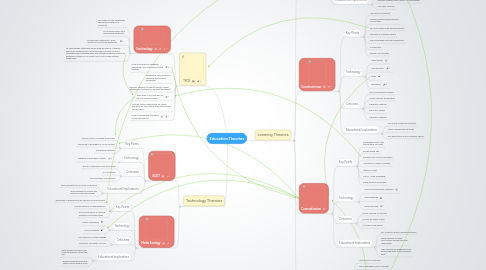
1. Technology Theroies
1.1. SCOT
1.1.1. Key Points
1.1.1.1. Humans Actions Influence Technology
1.1.1.2. Technology is Embedded in Social Context
1.1.1.3. Interpretive Flexibility
1.1.2. Technology
1.1.2.1. Anything Humans have Created
1.1.3. Criticisms
1.1.3.1. Ignores Consequences of Technology
1.1.3.2. It is Superficial
1.1.3.3. Does not take a Moral Stance
1.1.4. Educational Implications
1.1.4.1. Teach Students to be Critical Consumers
1.1.4.2. Teach students to Analyze the impact of Past Technologies
1.2. Media Ecology
1.2.1. Key Points
1.2.1.1. Technology Influences how we Perceive our Environment
1.2.1.2. Media influences Human Behaviour
1.2.1.3. Our Environment is a Complex Network of Communication
1.2.2. Technology
1.2.2.1. Online Newsfeeds
1.2.2.2. Social Networks
1.2.3. Criticisms
1.2.3.1. The Medium is not the Message
1.2.3.2. Individuals Perception can vary
1.2.4. Educational Implications
1.2.4.1. Have Students Compare and Contrast different Media they use
1.2.4.2. Examine What we Read and Where we are Reading From
2. TPCK
2.1. Teachnology
2.1.1. Your Belief of How Technology should and is used in the Classroom
2.1.2. TPCK should inform your Teachnology Statement
2.1.3. Teachnology Statements can be releated to Technology guildelines
2.1.4. My Teachnology Statement will be along the lines of "Students need to be Taught how to use Technology. Education is about Developing the Knowledge Skills and Attitudes Students need to be successful Citizens of our Planet. This is not Possible without Technology."
2.2. TPCK is the result of Pedagogy, Technology, and Curriculum coming together
2.3. Traditionally, we Focused on Pedagogy and Content Knowledge
2.4. Different Subjects (Content) are best taught with different Methods or Theories (Pedagogy)
2.5. Technology is a Crucial part of the 21st Century Learner
2.6. Just like certain Subjects call for certain Practices we also need to apply Appropriate Technologies
2.7. TPCK is represented with three Circles that overlap
3. Learning Theories
3.1. Behaviorism
3.1.1. Key Points
3.1.1.1. "Practice Makes Perfect"
3.1.1.2. Drill and Practice
3.1.1.3. Operant Conditioning
3.1.2. Technologies
3.1.2.1. Poll Everywhere
3.1.2.2. Leveled Games
3.1.2.3. Class Badge
3.1.2.4. Video Lectures
3.1.3. Criticisms
3.1.3.1. Learning is Complex
3.1.3.2. Our Minds are not Blank Slates
3.1.3.3. People Adapt
3.1.3.4. Learning is not always linked to Behaviour
3.1.4. Educational Implications
3.1.4.1. Managing Student Behavior
3.1.4.2. Motivate Students with Stickers or Class Badges
3.1.4.3. Use Video Lectures
3.2. Constructivism
3.2.1. Key Points
3.2.1.1. "The Mind is a Network"
3.2.1.2. Learning Happens when we Build Connections
3.2.1.3. We must Interact with the Environment
3.2.1.4. Start with a Complex Problem
3.2.1.5. Prior Knowledge from Past Experiences
3.2.1.6. Collaborative
3.2.1.7. Teacher is a Facilitator
3.2.2. Technology
3.2.2.1. Video Games
3.2.2.2. Lego Robotics
3.2.2.3. Blogs
3.2.2.4. ePortfolios
3.2.3. Criticisms
3.2.3.1. Time Consuming to Prepare
3.2.3.2. Mature Learners are Required
3.2.3.3. Subjective Learning
3.2.3.4. Difficult to Assess
3.2.3.5. Subjective Learning
3.2.4. Educational Implications
3.2.4.1. Set up and Manage an ePortfolio
3.2.4.2. Create Lessons that use Blogs
3.2.4.3. Play Educational online MiniQuest Games
3.3. Connectionism
3.3.1. Key Points
3.3.1.1. Knowledge Exists in the Connections you make
3.3.1.2. For the Digital Age
3.3.1.3. Knowing How to Find Information
3.3.1.4. Information is always Changing
3.3.1.5. Staying Current
3.3.1.6. MOOC = Free Knowledge
3.3.1.7. Ability to see Connections
3.3.2. Technology
3.3.2.1. Social and Professional Networks
3.3.2.2. Search Engines
3.3.2.3. Bookmark Apps
3.3.3. Criticisms
3.3.3.1. Formal Learning vs. Informal
3.3.3.2. How do we Assign Credit
3.3.3.3. Is it really a New Theory
3.3.4. Educational Implications
3.3.4.1. Set Students up with Learning Networks
3.3.4.2. Teach Students to make Connections through tools like Mindmeister
3.3.4.3. Help Students be Organized online by teaching them to use Bookmark Apps
3.4. Cognitivism
3.4.1. Key Points
3.4.1.1. "The Mind is a Computer"
3.4.1.2. Prior Knowledge is Key in Learning
3.4.1.3. Networks and Memory contain Active and Organized Information
3.4.1.4. Schemas and Scaffolding
3.4.1.5. Practice for Retention
3.4.1.6. Meaningful Effect
3.4.2. Technology
3.4.2.1. Presentations
3.4.2.2. Organizers
3.4.3. Criticisms
3.4.3.1. Ignores Affective and Psychomotor domains
3.4.3.2. Focus on Knowledge not on Understanding
3.4.4. Educational Implications
3.4.4.1. Make lessons Meaningful
3.4.4.2. Prevent Cognitive Overload by using Appropriate Presentations
3.4.4.3. Help Students Develop their Schemas with Online Organizers

